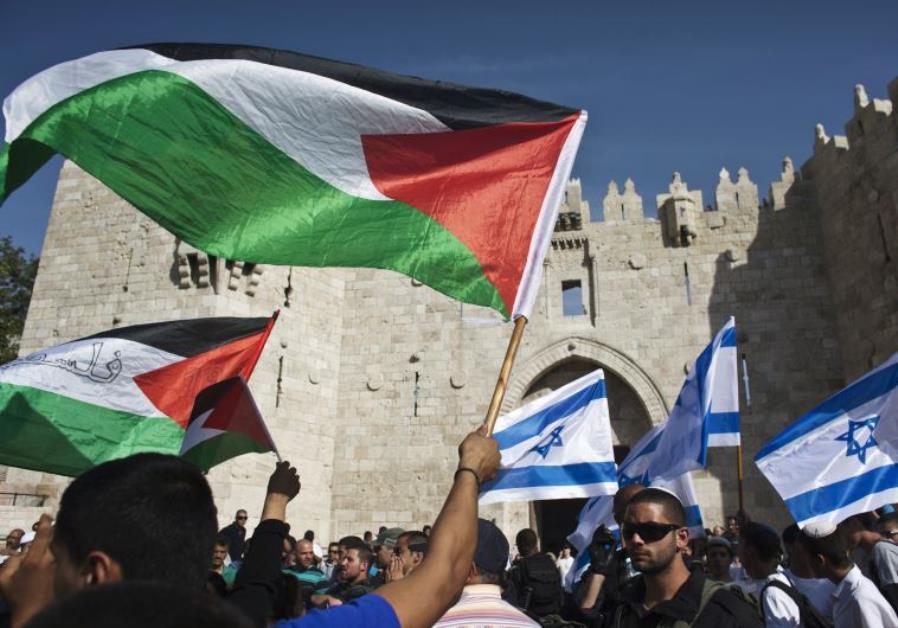UNITED NATIONS, Jan. 25 (Xinhua) -- Ambassadors of European countries to the United Nations on Thursday stressed that the two-state solution is the only viable path for the settlement of the Israeli-Palestinian conflict, and underscored the stabilizing role of the UN agency for Palestinian refugees (UNRWA).
"Let me first reiterate Sweden's long-standing and firm commitment to the two-state solution. There is simply no alternative," Swedish ambassador to the United Nations Olof Skoog told the Security Council in a debate on Middle East peace.
"Only a two-state solution, based on known parameters, international law and relevant resolutions of this council, can fulfil the legitimate aspirations of both Israelis and Palestinians and achieve the security and just peace that both peoples deserve."
He expressed concern over the financial restraints of UNRWA as a result of a severe cut by the United States in its contributions.
The United States donated 363 million U.S. dollars in 2017 to the agency. The U.S. government has just decided to allocate only 60 million dollars for 2018, creating an unprecedented crisis for the agency.
"UNRWA delivers critical services for the human development of Palestinian refugees and plays a crucial role to ensure stability in a region seriously affected by conflict, terrorism and turmoil. Given the extreme conditions facing many refugees, UNRWA's stabilizing role in providing basic services is imperative," Skoog said.
"Further, the work of UNRWA is essential to preserve the possibility of a two-state solution, as refugees are one of the final-status issues," he added.
With a current shortfall of 243 million U.S. dollars, UNRWA is facing the most acute financial crisis since its inception. Vital UNRWA operations and programs are immediately at risk unless extraordinary measures are taken. A reduction or termination of UNRWA operations would have serious and immediate negative consequences on the ground, causing instability."
In 1949, the UN General Assembly established UNRWA and mandated it to provide assistance and protection to what are today more than five million registered Palestine refugees in Jordan, Lebanon, Syria, as well as the West Bank and Gaza.
"UNRWA was mandated to carry out this task until a negotiated, lasting and just solution to the Palestine refugee situation was reached. ... It is for this reason that we must continue to shoulder our responsibility for Palestinian refugees through a functioning UNRWA," said Skoog.
He noted that UNRWA has undertaken key reforms at unprecedented speed, and as a result has achieved a high level of cost efficiency in its operations and programs. Through reforms in 2015 and 2016, it saved 81 million dollars last year.
The ambassador said his country contributed 65 million dollars to UNRWA last year, making it the fourth largest donor. In light of the acute financial crisis, Sweden has advanced its initial payment for 2018 to the agency, he said.
Karel van Oosterom, the Dutch ambassador to the United Nations, also reaffirmed his country's commitment to the two-state solution.
"A two-state solution is the only viable way of fulfilling the aspirations of Israelis and Palestinians alike, to live in peace, security and dignity," he said.
On UNRWA, he said; "We should not politicize humanitarian aid."
"We firmly believe UNRWA plays a key role as the United Nations humanitarian organization to provide basic health care, education and emergency relief to Palestine refugees. Especially in the Palestinian territories, their role is indispensable since UNRWA provides 50 percent of all humanitarian aid, but also in the challenging environment of Lebanon, Jordan and Syria."
The Netherlands has been a strong supporter of UNRWA over the years and will remain so, especially with the current difficulties, he said. "In view of our concerns regarding UNRWA's financial situation, my country has decided to front-load its contribution to UNRWA for 2018."
In his statement, UN ambassador Tore Hattrem of Norway echoed the representatives of the Netherlands and Sweden.
"Long-term peace, security and prosperity for both Israelis and Palestinians can only be achieved through a negotiated two-state solution," he told the security council.
The outstanding final-status issues must be resolved through direct negotiations between the parties, with support from the international community, he said.
Hattrem noted that the political process has been at a standstill for years, and the situation is becoming increasingly tense and dangerously fragile.
He recognized UNRWA's crucial role in the delivery of essential services, especially education and health care. "In these efforts, UNRWA also has a vital role in preserving stability in the region, particularly in Lebanon and Jordan."
Stephen Hickey, acting British deputy permanent representative to the United Nations, reiterated his country's long-standing commitment to the two-state solution. "We envision an Israeli and a Palestinian state living peacefully and in security and prosperity side by side, within secure and recognized borders and with Jerusalem as a shared capital."
"We call on the parties to take urgent steps to reverse the current negative trends on the ground, to refrain from unilateral actions, and to start renewed and meaningful peace negotiations," he told the council.
On UNRWA, he said his country remains a firmly committed supporter. "We recognize its unique and important mandate from the UN General Assembly, providing vital services to the Palestinian refugee population, both in the occupied territories and in Jordan, Syria, and Lebanon."
"Although we do agree that there is an urgent need for UNRWA to become more efficient and cost effective by stepping up the pace of reform, UNRWA must continue to be able to carry out its important functions. Any unexpected reductions or delays in predicted donor disbursements can have damaging impacts and undermine stability in the region."
The ambassadors also expressed opposition to Israel's settlement activities in occupied Palestinian territories.
